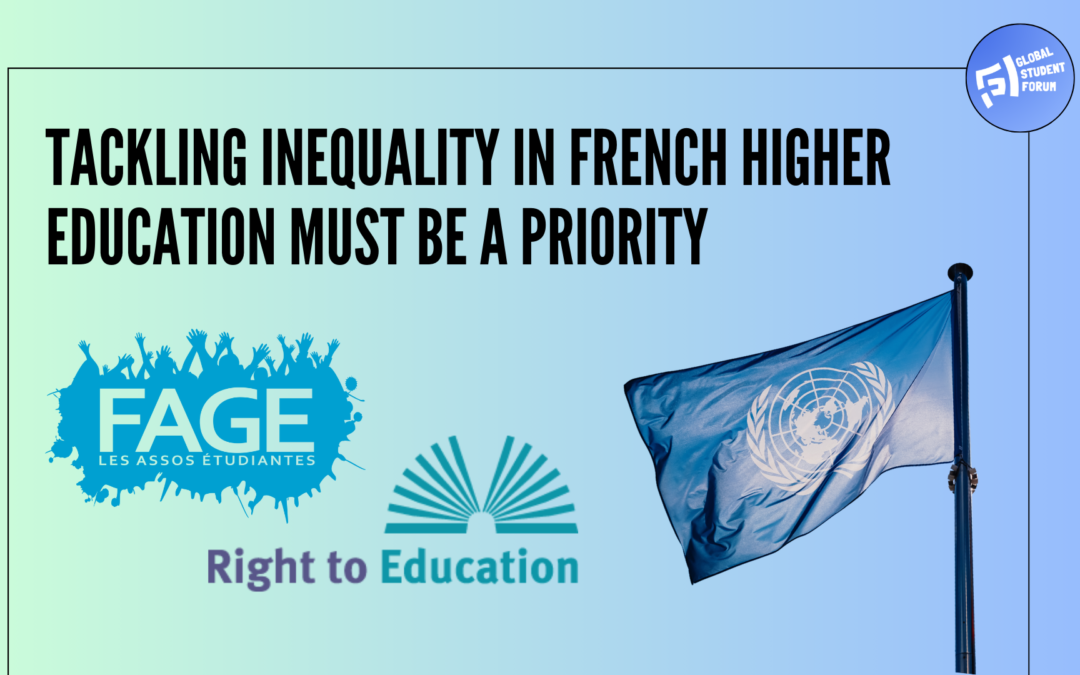On 16 October, the UN Committee on Economic, Social and Cultural Rights (CESCR) published its concluding observations on France, concerning its five periodic reports. As part of its assessment of France’s compliance with the International Covenant on Economic, social and cultural rights and related obligations, CESCR considered the right to higher education.
CESCR raises concerns about territorial inequalities in access to and participation in higher education in France, while stressing the decline of the State budgetary allocation per student which is contrary to the ‘obligation to progressively achieve the full realisation’ of the right to higher education.
To inform the review process, the Right to Education initiative (RTE), Fédération des Associations Générales Etudiantes (la FAGE) and the Global Student Forum (GSF) submitted a joint report to CESCR which drew attention to the insufficiency of public policies which aimed to reduce inequalities in access to higher education implemented by the French government since the last French periodic review by CESCR in 2016. The report argued that structural, territorial, and socioeconomic inequalities, as well as France’s higher education financing policy, were hindering equality and non-discrimination in access to higher education and increasing the trend in higher education privatisation.
CESCR has drawn upon this information to make a series of recommendations to France. Among these recommendations include that the State deploys ‘the necessary means to make higher education accessible to all on a basis of full equality, taking into account the needs of students from disadvantaged socio-economic backgrounds and of regions where higher education opportunities are limited’. CESCR also recommends that budget allocations are reviewed, with ‘a view to the gradual introduction of free higher education’.
La FAGE, the Right to Education Initiative and Global Student Forum welcome the Committee’s focus on the need for appropriate financing and the eradication of inequalities in access to and participation in higher education.
Delphine Dorsi, Executive Director of the Right to Education Initiative, said: ‘This is a major step forward for the realisation of the right to higher education in France, and a huge success for RTE and other organisations who have campaigned for the realisation of the right to higher education. We have been working to raise awareness on these issue of inequalities for five years in collaboration with students from the Sciences Po Law Clinic, and we’re delighted to see CESCR’s recommendations which are relevant not just within the territory of France, but in other contexts in which inequalities stratify and limit access to and participation in higher education.’
Maëlle Nizan, Chair of la FAGE, said: ‘These recommendations represent real hope for access to French higher education. We congratulate this success, which is the result of a strong commitment on the part of the authors and signatory organisations who submitted the report to the CESCR. For several years now, the FAGE has been denouncing the underfunding of our public higher education system, which seriously affects study conditions and undermines student success. What’s more, students are becoming increasingly insecure, and studying is becoming a luxury. The government’s failure to take ambitious action to eradicate inequalities in access to education is extremely worrying. Our higher education system must be accessible and guarantee equal opportunities.’
Sebastian Berger, Executive Director of Global Student Forum, stated: ‘The Committee’s recommendations highlight the pressing need for equitable access to higher education in France. This is a crucial step towards dismantling barriers and ensuring that every student, regardless of background, has an equal opportunity to pursue higher education.’
CESCR is composed of independent experts and mandated to monitor how states who have ratified the International Covenant on Economic, Social and Cultural Rights are complying with their obligations. The concluding observations on France follow a process of examination of its reports and an open call for alternative reports from civil society, and contain an assessment of the State’s progress, along with a series of recommendations.


